#also lets talk about the unnamed red line that narrator makes you go around in circles with
Explore tagged Tumblr posts
Text
am i allowed to say the adventure line™ does not end with an arrow or would i get killed for that
#crow thoughts#/HJ#LMAO#this is a joke but also not because it does not end with an arrow#just ends with a line#but i feel like this is an obvious thing that people know but ignore cause the arrow is more fun#so if that is the case then you are fully allowed to kill me on sight#forgive me im always late to the party on these things. i explore at my own pace#also lets talk about the unnamed red line that narrator makes you go around in circles with
96 notes
·
View notes
Text
i actually made my own post about this a few months back, but yes! i agree that there's sooo much potential to read ennis as being on the ace/aro spectrum.
like, we enter the story understanding he has a fiance who he's going to marry back home, but you get the sense that he's never had sex before that first night with jack? in the movie when jack talks about "sinners like you and me go marching off to hell", ennis says, "you may be a sinner, but i ain't yet had the opprtunity." a lot of people over the years have understood this line as being an admission of him being a virgin. i think this reading is supported by this sentence in the short story the film was based on, during their first night having sex together:
Ennis jerked his hand away as though he’d touched fire, got to his knees, unbuckled his belt, shoved his pants down, hauled Jack onto all fours, and, with the help of the clear slick and a little spit, entered him, nothing he’d done before but no instruction manual needed.
Like sure, you could argue that the narrator could be saying that the thing he'd never done before was the specific at of having anal sex with another man, but I dunno... it just makes sense to me that Ennis would be a virgin before this moment with Jack in the tent. Knowing the conservative Christian society they live in, would Ennis have pressured Alma into having sex before marriage? I'm not sure he would've. In a later moment of intimacy, when Alma and him are nearing the end of their marriage, she asks him to use protection and he says, "If you don't want no more of my kids I'd be happy to leave you alone." Like? He's willing to give up sex with his wife entirely if it doesn't result in a child?? Ok. You get the sense that their intimacy is already strained before this point, so really the only other sex he's having is with Jack on his fishing trips, which he takes around 1-2, 3 times a year MAX. And then right after this they get a divorce, which really hammers home the idea that like... the death of sexual intimacy within their relationship was the straw that broke the camels back.
The only other potential sexual partner mentioned in Ennis' life is Cassie the waitress (who is an unnamed, passing mention in the short story, btw), but you also don't really see him show any real desire for her, romantic or sexual. She's the one who approaches him in the movie, and well. This is all the short story has to say about her, which should give you an idea of Ennis' affection for her:
Ennis said he’d been putting the blocks to a woman who worked part-time at the Wolf Ears bar in Signal where he was working now for Car Scrope’s cow-and-calf outfit, but it wasn’t going anywhere and she had some problems he didn’t want.
Overall, you get the sense that being with a woman is just like... something he does out of social obligation, yanno. Like marrying Alma was just something that you're supossed to do (especially as an orphan who's caretakers were moving on with their own lives), and like dating around is something a bachelor should do after getting a divorce. This also goes with this reocurring theme of Ennis being a passive decision maker and letting life sort of guide him wherever it sees fit...
If we're viewing Ennis under an aro/ace lens, I personally prefer to read him as demsexual/demiromantic simply for the fact that sex is actually a really big part of his relationship with Jack, especially within the short story. Their days on the mountain after that first night in the tent are described like this:
Ennis woke in red dawn with his pants around his knees, a top-grade headache, and Jack butted against him; without saying anything about it, both knew how it would go for the rest of the summer, sheep be damned.
As it did go. They never talked about the sex, let it happen, at first only in the tent at night, then in the full daylight with the hot sun striking down, and at evening in the fire glow, quick, rough, laughing and snorting, no lack of noises, but saying not a goddam word except once Ennis said, “I’m not no queer,” and Jack jumped in with “Me neither. A one-shot thing. Nobody’s business but ours.”
During their motel reunion scene Ennis, laying naked with Jack, also has this to say:
"You know, I was sittin up here all that time tryin to figure out if I was—? I know I ain’t. I mean, here we both got wives and kids, right? I like doin it with women, yeah, but Jesus H., ain’t nothin like this. I never had no thoughts a doin it with another guy except I sure wrang it out a hunderd times thinkin about you."
And during their final fishing trip, on one of the nights before their big fight, Jack puts his hands between Ennis' legs and Ennis starts undoing his buttons in between talking abt their families. After the conversation dies, "they rolled down into the dirt." So I think there is a lot of evidence within the source material that shows sex is a big factor in their relationship, and is arguably like? What begins their romance too? I think think the only reason we don't see much of this within the film is, sadly, bc of homophobia. I'm pretty sure they scaled down a lot of the sexuality present within the source text in order to get a wider release, or to be a liiiittle more palatable to more audiences at the time of it's release. Afterall, there is only one (pretty tame, by today's standards?) gay sex scene in the entire movie and people hand-wrung about how explicit and pornographic it was for yeaaaars after its release. But that's not to say that Ennis isn't framed as like... sexually interested in Jack. I mean, the way Heath plays Ennis shoving Jack down and fucking him is so animalistic and desperate, I think a lot of people read that scene as Ennis being forced to confront a desire that has been present for at least a little while.
So like, I think it's fair to say that Ennis could be somewhere on the asexual spectrum rather than strictly ace because it's plausible that he meets Jack and forges a very deep bond with the first person in his lonely life who he has sooo much in common with, and that bond eventually turned into a crush, which eventually turned into a lust that he didn't know was even there until Jack awoke it from within him. But yeah, the fact that he does display a general apathy towards sex, like he's fine with giving up sex with Alma if she doesn't want to have his kids, he's fine with only having ~3 max weeks to have all the sex he wants with Jack, and that he doesn't seem to be rotating thru sexual partners frequently either...it definitely rings a lot of ace-y alarm bells in my mind, lmao.
As an asexual myself, I actually personally read Ennis as a very repressed, very in-denial homosexual, but that's just bc I think his like... disinterest in sex, or his being satisfied with limited sex, can be attributed to other things, you get me? Like, his sexual disinterest towards the women in his life can be explained by the fact that he's just not attracted to women in neither a romantic nor sexual sense. And people can argue, "well why doesn't he just find sex with other men like Jack does?", but I think the fact that he does have trauma probably contributes to him not searching for any male sexual partners outside of Jack. It's not like he went searching for Jack in the first place. Hell, the short story says neither of them even thought they'd make a friend when they took the shepherding job, but both were pleasantly surprised in having found one in each other. So like... I don't think Ennis has it in him to even search for friends, much less sex with another man, outside of Jack.
I also think the story does a good job of showing that Ennis is very... devoted to Jack? Like, i'm not saying Ennis wins "most faithful person in the world" award, but you get the sense that like... the main relationship in his life, from an emotional standpoint, is the one he has with Jack. So maybe he's fine with spending the rest of the year with his right hand, the thought of Jack, and some female stand-ins to take care of the needs of the body if it means he actually gets to be with Jack for twoish weeks.
Or maybe he just has a lower libido than everyone else in the story too, lol.
Anyways, sorry for the long ramble haha, I love talking about this piece of media so much. Also please don't take this post as me saying your interpretation is invalid or anything like that, I actually really appreciate another ace pal seeing a similar potential reading of Ennis as ace as I did when I first rewatched the film two years back! It's really validating haha. Overall I just really love all the potential readings you can make into these character and their inner lives... like it just shows that queer struggles can be very similar no matter the identity/label we use for ourselves. and also like it's kind of interesting to think about how no matter what sort of "queer" Ennis is, he also would probably never identify himself with any of them if he somehow mamaged to learn about them just bc of how ingrained it is for him to reject anything but rigid heterosexuality...
heya !! here's a queer poll for anyone who has watched brokeback mountain at least once (i'm sorry it seems i can't stop thinking about it) and feels like helping me sorting out my doubts
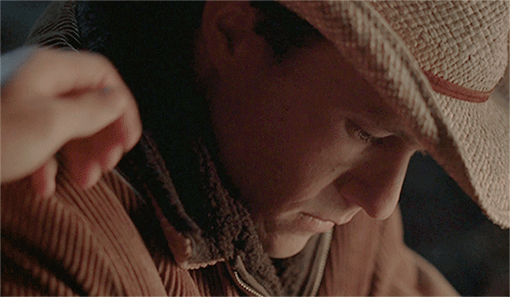
i watched this movie two days ago for the first time and it gave soooo much food for thought. i really can't seem to stop myself from carrying out my ordinary tasks to ponder questions related to the movie, its storyline and its characters. as soon as i woke up this morning, my brain produced a string of queer thoughts about ennis and jack's relationship and their approach to intimacy, needs and desire. and that's where this question popped up - ennis doesn't really seem to care much about satisfying his needs (if any) both when it comes to his relationship with jack and with the girls in his life (alma, casey). he doesn't ever seem to show any sign of attraction (especially sexual) when he's with jack, but also when he's with his wife. i know the point of the movie has nothing to do with labeling one's sexuality, but as a fellow ace i welcome open heartedly any ace reading on any character (and trust me i relate a lot to ennis on many levels, so the question on reading his sexuality is very genuine for me). still, what is slowing me down in asserting ennis could have an asexual reading is the major amount of trauma he lives with, which in fact does condition his choices, his persona and his personality. it's hard for me to hive off the personal traits he has developed in relation or as consequences of his trauma and the ones who are original and spontaneous to his person.
let me know what you think about it !!
29 notes
·
View notes
Text
Rev Recaps Hard Contact (Chapter 20)
Final chapter at last!
CW: Violence & blood. Decapitation.
TL;DR Recap: Darman and Etain make it back to the gunship with the injured Atin and Uthan in tow, but Etain refuses to let Zey leave without Omega. Niner lures Hokan into a trap and Hokan is decapitated. Zey offers Etain a choice, but 12 years later the framework still makes no sense.
Beginning Kal Count: 39 Ending Kal Count: 42
This post includes my favorite scene in the book, and has probably double the expected word count because of that. Long-Ass Post.
We open with a Kal Quote. I am ignoring Kal Quotes this far into the game because I am already very informed on Traviss’s opinions, but that does raise the Kal Count to 40 already.
Instead, we focus on Darman writing poetry to a gunship.

:’) Dar has similes and metaphors down at least. Some unnamed clone troopers (white-armored) and a medic come running out and dismiss Darman when he tries to tell them everything that happened to Atin because he’s already adequately marked Atin’s armor. They’ve also taken Uthan, so with, finally, nothing left for Darman to do, he turns around to watch Zey and Etain.
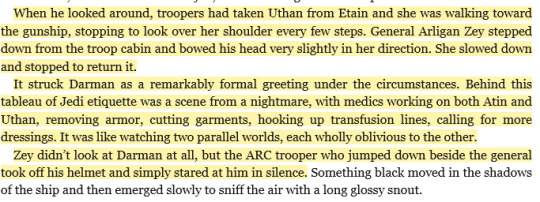
So Etain doesn’t ask who Zey is at all anywhere in this scene, which even with the Force telling her he’s a Jedi and logical clues telling her she’s outranked, you would think that she’d want his name. She also uses his name in her narration later without being told it on screen at any point. So that makes me think they’ve met before this, at least briefly.
On the other hand their greeting is “formal”/ “etiquette” , not Etain being relieved that fucking finally, here is an adultier-adult whom she knows and trusts, so I don’t think they know one another well.
I’m sure the formal greeting vs “scene from a nightmare” thing is meant to be pointed, but whatever, we’re moving on. Well, except, I do have to point out:
The ARC, who I am calling Maze until I have evidence he’s not, takes off his helmet, doesn’t say shit to Darman, just stares at him. I don’t know why that makes me laugh.
Valaquil departs off the gunship, Darman praises Jinart, and Dar hopes the Republic will keep their word to the gurlanin because “they deserve it”, but we’ve long passed the point where I gave a shit about the gurlanin.

Zey’s priority --> mostly tactical, get this shit show of a mission over, but does try to reassure Etain
Etain --> where are my people???
I love how Dar expects Etain to “soften” because he knows that she longs to be confirmed as having worth and value, has learned this even after a very short mission, but Etain is also deeply loyal and her priorities have shifted.

Um, Maze, buddy? You want to chill?

OH OUCH MY HEART.
We as readers know that their helmets were shut down by the EMP, but here’s Darman, assuming that he’s just lost another half a squad and that just like Geonosis, he’ll never know for certain what happened to them. The flashback is heartbreaking.
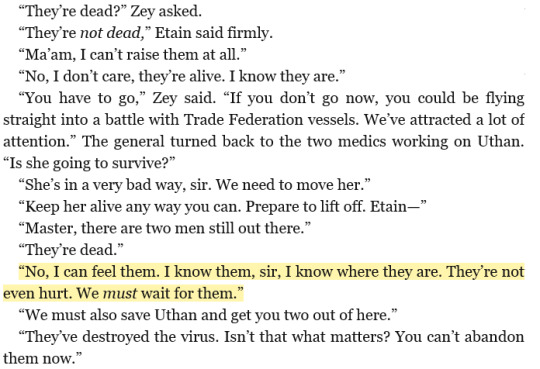
Etain’s ability to use Force-sense is so weirdly inconsistent and plot-selective in this book, but I love her already being able to tell from a distance that Omega squad is okay, even to tell where they are. This is the precursor to her being able to feel Darman “across star systems”, but on some level she’s formed some version of this bond with all of them.
And you know, no one in this book ever explains why the Republic wants Uthan so bad, but knowing from Order 66 that Palps wanted to use her for his personal goals always pisses me off.

Darman has become familiar enough with Etain and her expressions that this expression immediately sets off his “oh shit” radar, and it’s not even the first time.
The one boot on the gunship and one on the soil is actually a nice tiny bit of symbolism- caught between what the Jedi expect of her and what she’s learned under fire from Omega- if you chose to interpret it that way. And I can actually sympathize with Zey’s annoyance here because Etain, tactically, is being pretty stupid here. If Uthan dies before they can get her proper care, if they can’t get off the planet, then it’s all for nothing.
But. I wouldn’t want her to react any other way. This is exactly my favorite moment of hers. (Which is why I have the entire damn thing highlighted before anyone calls me out for that lmao.)
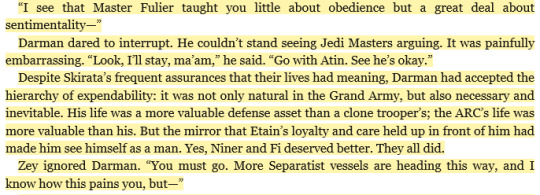
Listen, Zey, you know ilu, but bringing up her dead Master in a less than complimentary way was supposed to... do what exactly for your argument? He also completely ignores Darman’s attempt to keep the peace, but we just upped our Kal Count to 41 with the talk of Etain’s loyalty being a mirror.

Again, tactically pretty dumb I’m sure but oh holy hell do I love it. Especially that underlined bit in red. “Darman thought she had changed her mind, but that wasn’t Etain at all.”

Darman desperately not wanting Etain to be targeted by whatever Jedi mind powers he thinks Zey is about to use on her. Darman thinking about how Zey doesn’t know Etain at all, that Zey is taking 100% the wrong approach, but if Darman was just allowed to talk to her-

That bit in red? That and the response Zey’s about to give are two of my favorite lines in the entire book.

Zey gives in. Darman tries to get Etain to stay anyway, I think because he’s worried about the fallout of this moment landing on her, although it’s kind of too little too late for that. But Zey, as tactically expensive as this could be, as annoyed as he has been, is still proud of Etain.
It’s just one little tiny moment that says so much about Dar and about Etain and even about Zey. That little moment of pride lets me think they were better suited to Master and Padawan that maybe either of them recognized or would later accept.
Unfortunately, we now have to leave my favorite scene ever and return to Hokan’s POV. Hokan is injured and doesn’t know where Fi has gotten to, but as expected, Niner’s screaming has caught his attention.

Hokan has this weird double consciousness, this deeply rooted aversion to mercy or anything he sees as weakness or softness. It’s still a really... delicate little moment?

Listen, I know that Niner’s not wounded and this still is upsetting.
Kal Count 42.
Hokan still is vacillating between thinking of Niner as an it more than a person, and “abomination” and thinking of him as a Mandalorian man who’s been unfairly used. Again, it’s this weird moment of double think, but it works in Niner’s favor, because nobody wants to know what would have happened if Hokan hadn’t taken the time to talk to him, or had decided to use the lightsaber.

The sheer irony of Hokan avoiding the lightsaber because it was too much like what happened to Jango on Geonosis... and then Etain decapitates him... with a lightsaber.

Niner says he doesn’t like to complain, but. Also, still very fair. And a much needed laugh after that last moment.

“Probably okay” Fi.
Also This raises SO MANY questions because Mando armor is supposed to hold off Jedi if it’s beskar, but this isn’t, which means Fi spends the rest of the series hoarding and or wearing armor that isn’t beskar.
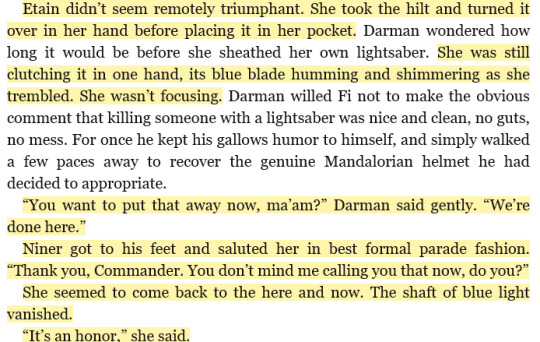
Etain is trembling, we’ll find out from her POV, because she’s still reacting to hearing Niner scream like that, and it rattles her deeply. Which again, I sympathize with, because it makes me upset.
But I mean, even if Traviss forgets it... there has to be a lot of emotion to being handed Kast Fulier’s lightsaber. He was the only one who was kind to her in the Order, at least from her point of view, she failed him, he was tortured to death with that lightsaber, and now it’s being returned to her. This is the closest she’ll ever get to closure, because as with Omega’s original brothers, there are no bodies left for burial. KT completely ignores the weight of that... but I think about it a lot.
Darman being gentle with her and praying that Fi doesn’t open his mouth makes me feel soft, though. And Niner gives her a tiny bit of the acknowledgement/respect she's wanted.
We go to her POV next:
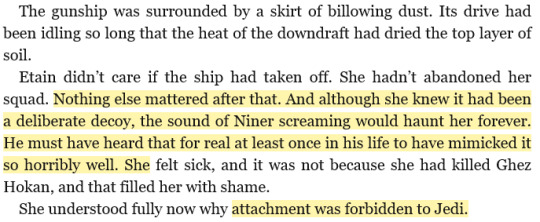
Same, Etain. Same. Again, as she points out... Niner’s heard that before. And none of the rest of the squad who was there for it even really seems fazed?
She’s also guilty about not being Jedi enough of course, but that’s nothing new at this point. And I’m sure Fi and Niner can appreciate her not-Jedi instincts. (Or does Zey’s tacit approval mean actually her stunt with the gunship is rooted in some Jedi ideals, even if it’s tactically stupid? idk.)

Maze & Zey take turns doing the pacing, confirmed. It’s just funny because earlier Zey was annoying the shit out of Niner by pacing and breaking up the holos at the briefing.

ZEY BACKSTORY! ZEY BACKSTORY! IDGAF ABOUT KAL; WHERE’S MY ZEY BACK STORY.
Ahem.
Anyway, the conversation turns to what actually happens to Etain now. She is, after all, an orphaned Padawan in the middle of war time.

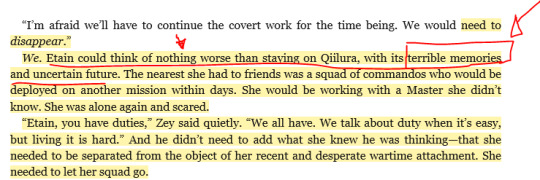
“Etain could think of nothing worse than staying on Qiilura, with its terrible memories and uncertain future... She was alone again and scared.”
Okay, so we can debate what Etain’s duty is in this scenario. As Zey says, she knows better than anyone what Qiilura is like, and that’s info Zey can’t attempt to replicate, even if he reads Omega’s reports. It wouldn’t be the same as having Etain’s first hand experience.
But that... still leaves Etain “alone”, “scared”, stuck on a planet that is “full of terrible memories” and is associated deeply with at least three months of trauma. And she’s going to accept that, because she’s being guilted with the Jedi values of non-attachment and duty to the Republic. But I don’t know that this is the healthiest way for her to finish out her training. Like. Do the Jedi not have counselors or something, Zey?
It’s just... really sad to me.

a) Note to self about the body language here again. “dug her nails into her palms”, tried to compose herself.
b) oh shut up about what’s expected of soldiers; not everything has to be comparative
c) I had a conversation with samwichwilson about this scene that’s probably still in the tags somewhere.
But the framework of this choice makes absolutely ZERO sense to me.
Like, my kingdom for the AU where Etain chooses to go with Omega squad and spends the next nine months learning to blow shit up with them. I have no idea how that would work since she’s a Padawan and still technically needs a Master’s supervision, but I would enjoy it. She would definitely be happier than she’s gonna be on Qiilura.
But... while the narrative is presenting this as serious-ish options... like, there’s no way Zey would have actually go through with that last one, right? Point about working undercover aside, if he’s offering to let one clone stay, he might as well offer all 4, and he specifically narrows it down to one of the squad, not all of Omega.
So while Etain typically seems to believe an even lower opinion of her than KT actually writes (to match her low self-esteem) I have to assume that she’s right and she’s being tested here? But Zey, what the hell were you going to do if she said yes and asked to go with Omega? Much less if, when she accidentally caves here in a moment, Darman had said yes and agreed to stay with her.
She would have failed the test, and you can’t really let them start dating under your supervision... so what are you gonna do about that?
Anyway, it doesn’t matter. As unfair as it is, the choice is not really a choice, and Etain has been guilted into remaining in this place she hates. She’ll probably even end up working with Jinart again. Bleh.

Etain seems to be taking these options as if they’re really, truly serious here, but as a reader, it’s incredibly hard to see them that way. Because again. What’s Zey gonna do if she fails the attachment test.
(Unless you want to argue that the predilection with Jedi non-attachment and rules breaking is 100% in Etain’s head here and her guilt and mental conditioning just won’t let her see that Zey is 100% truthful and kindly letting Etain go off with these people she’s become so desperate to attach herself to. But that doesn’t fit like... any canon about the Jedi Order. Or ANY of Traviss’s writing tbh.)

I mean, at least Etain knows herself pretty well here. Her brain is going “abort abort, abort” but can’t actually stop her from doing the stupid thing. She’s also trying to communicate to Dar that this isn’t her abandoning him, this is her still caring.
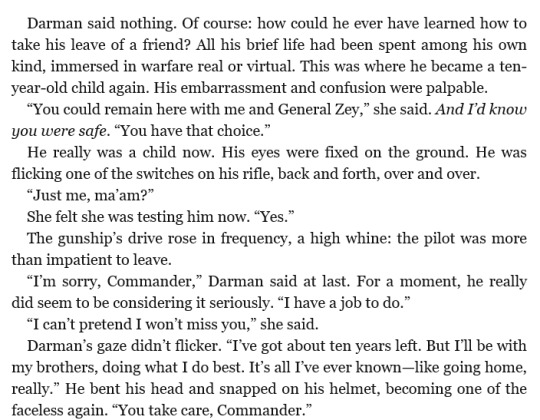
Listen, you can point out Dar’s lack of experience and still miss all the “child” bullshit. And honestly, his response to her saying that she’ll miss him comes off... almost a little cold. “You’ll miss me. I’m going to die in ten years, but don’t worry about me because I’m going the closest I have to home.” Maybe he’s trying to reassure her / also not to admit to someone who is now an Officer again that he’ll miss her too. It just sounds weird, even if we get the line that he was “considering it seriously.”
Or I guess what really annoys me is that in this moment that should be really personal and painful for these two characters, this just sounds... weirdly preachy?
Also...like... again Etain had to know that it wasn’t an actual option, even if the rest of the series will pretend that it was, including when she looks back at it in Triple Zero. But I’m choosing to read it more as a mark of her desperation- being so desperate and lonely, and, yes, a little trapped that her emotion overrides what she knows to be true.

💔💔💔
There’s some lines about how she’s a better Jedi Forever now because of “a soldier faith in her” but I have mixed feelings about those because they’re followed up with a bunch of bullshit about how she should learn from him because he had accepted his fate and had no self pity, and I don’t have time for ANY of that. You are allowed to feel bad when bad things happen to you, even if you are a woman or a Jedi.. Fuck off, Traviss.

Sweetheart.

Listen, you know and I know that she’ll see them again, she and Darman will fall in love, she isn’t trapped on Qiilura, a place of her nightmares, forever.
But it still feels like a real fucking downer of an ending.
Still, we have now officially made it to the end of Hard Contact. I haven’t decided if I’ll make posts for Triple Zero or if they’ll follow this format if they do. (Your thoughts/comments/feedback are welcome, as always.)
Final Kal Count was 42, which is actually impressive for a 20 chapter novel in which he DOES NOT APPEAR.
#Rev Recaps RepComm#Republic Commando#Hard Contact#RepComm#Etain Tur-Mukan#Darman Skirata#Niner Skirata#Atin Skirata#Fi Skirata#Arligan Zey#Captain Maze#I think
18 notes
·
View notes
Text
Twisty Turns and Horror
“Every story ever told can be broken down into three parts. The beginning. The middle. And the twist.” — Jack Black as RL Stine in Goosebumps
I want to talk about twists.
Specifically, I want to talk about two primary types of twists in the horror genre, and how and when each can be employed -- and the pitfalls of both.
But first, a caveat: What do I mean when I say “twist”?

A plot twist occurs when the audience’s expectations are subverted.
Based on the existing information in a storyline, a reader or viewer expects a certain outcome. A twist occurs when something unexpected happens instead. But a twist is not a mystery. A mystery presents a question -- who did it? how? what happened? -- and then challenges the audience to figure it out before the characters involved. A good mystery requires you to lay down foreshadowing and set up all of the clues, providing red herrings as necessary to distract the audience, before tying it all up at the end with a neat bow.
A twist, on the other hand, does not necessarily require such setup and foreshadowing. And, indeed, some of the very best twists in the genre do away with such things entirely.
So with that out of the way, let’s talk about the two types of horror twists -- what I’ll refer to as The Hitchcock Twist and The Shyamalan Twist.
By nature of the subject matter, this will be spoiler-heavy, so follow under the cut!
Alfred Hitchcock and M. Night Shyamlan are two directors who made their careers from creating movies with a twist. Although plenty of other horror directors employ the same techniques, the careers of Hitchcock and Shyamalan are defined by twists in a way others are not.
But -- however much he may try to emulate him with his signature on-screen cameos -- Shyamalan trades in a very different type of twist than Hitchcock. Taken at a plot level, the two approaches to storytelling are actually completely opposite.

A Shyamalan Twist Occurs at the End, Reinterpreting Everything That Came Before
Let’s briefly review Shyamalan’s twists to see what they have in common, shall we?
The most famous -- in The Sixth Sense, we discover at the end that the character played by Bruce Willis has actually been dead the entire time, and that he is just another of the ghosts the little boy can see.
In The Village, we learn that what appears to be a rural pioneer settlement is in fact a modern commune that’s been lost to history for a couple generations, and the monsters are manufactured as a way to keep the inhabitants in line (and from escaping).
In Unbreakable, we discover that the story isn’t just the hero origin story for Bruce Willis’s character, but the origin story for the villain Mr. Glass -- who was responsible for the accident that set the hero on his journey in the first place.
In The Visit, we find out that the kids haven’t been staying with their grandparents at all, but rather with a pair of escaped and murderous mental patients.
What do all of these have in common? The twist is revealed at the climax of the film, and it acts to completely reinterpret the events that came before it. You’re left leaving the theater to think about everything that came before the twist, and try to find a way to piece it all together. All of your expectations up to the climax have been subverted, and you’re left to do the work of figuring out how to make sense of what you’ve seen (or not, of course - perhaps you leave the theater without ever thinking about it again).
Done well, this twist can be incredibly powerful because it invites interaction from the audience even after the story is finished. The twist introduces new questions that it doesn’t answer, and conversation can spring up around finding solutions for it -- either within the text itself, or contemplating it in a larger context. Done well, a Shyamalan twist can lead the audience toward introspection and create a haunting effect.
Done poorly, of course, it can feel cheap, cheesy, unearned, or just downright stupid. That’s the greatest risk of the Shyamalan twist -- it can leave the audience thinking, “Who cares?”
Of course, Shyamalan didn’t invent this sort of twist -- it’s just what he’s best known for -- and there are tons of other examples out in the wild. Here are a few to consider:
The Twilight Zone -- When I’ve delivered this talk before (if you can call “rambling about movies to my coworker” a talk), it’s been pointed out that this twist was really codified first by The Twilight Zone, and I should really call it a Serling twist. Well, I’m not doing that for two reasons. One, because Serling never tried to draw a direct parallel between himself and Hitchcock, so Shyamalan is really inviting himself to this discussion. Two, because The Twilight Zone uses the formula a little bit differently.
First, not every Twilight Zone episode had a twist ending (although the most famous ones did, probably for the reason I mention above -- people like to talk about surprise endings, and they stick in the memory). But more importantly, the twists were the story. The sci-fi/horror shorts were structured like jokes where the twist was the punchline, often crafted to deliver a particular message or parable. Most of the episode existed to set up the twist, with little time spent on extraneous plot and character development. Thus, Twilight Zone stories are more clever than shocking. Still, they are a treasure trove of storytelling to study, and they make for a wonderful compare/contrast with Shyamalan’s films.
Other notable Shyamalan-style twists:
Fight Club, where we learn that Tyler Durden is not real, but rather the alter-ego of the seemingly meek and unnamed narrator.
Memento, where we learn that the film’s core mystery has been solved numerous times, only to be forgotten -- and that the main character is being manipulated every step of the way.
Orphan, where we learn that the titular orphan with homicidal tendencies is in fact a grown woman with a peculiar form of dwarfism who is manipulating the families who adopt her. (the movie is better than that plot synopsis makes it sound, I promise)
In Hide and Seek, we learn that the little girl’s evil imaginary friend (at times implied to be a ghost) is in fact her father’s alternate personality.
There are, of course, lots more. There are also some near-misses. For example, despite its bleak “gotcha”, the ending of The Mist -- where the main character mercifully kills his fellow survivors before running out of bullets to use on himself, only to find that help was just around the corner -- doesn’t quite count. It’s a shocking and heart-wrenching twist, but it doesn’t fully redefine the film that came before it.
Pros to the Shyamalan Twist:
Gives your audience something to think about long after they walk away, generating discussion and hopefully that haunted “I need a minute” feeling to process the story.
Invites a second watch/read in order to pick up the clues and pieces and see how the story unfolds differently after you know the ending.
Cons to the Shyamalan Twist:
Can feel cheap or un-earned if the twist makes the events of the film no longer seem to matter (eg, “it was all a dream!”)
Often ends up relying on ableist mental health tropes (split personality, escaped lunatic, etc etc.), so please do something new with it
Can completely fall apart if the ending is spoiled ahead of time, making it difficult to succeed in a post-internet environment.
All in all, the Shyamalan Twist can be a powerful storytelling tool, but it can also fall flat on its face. The thing that will make it succeed is if the other elements of the story, especially the characters, are compelling enough on their own to make the reader want to know more.
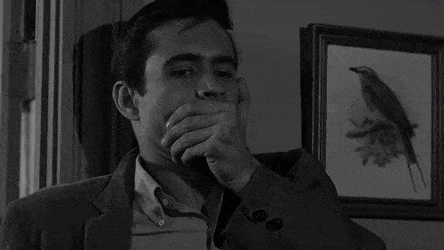
A Hitchcock Twist occurs early in the film and changes the rules of what you’re watching
A primary characteristic of the Hitchcock twist is that it happens early in the story -- about 1/3rd to 1/2 of the of the way through. It sets up a premise, invites you to get invested in the characters and their situation, and then pulls the rug out from under you by dramatically changing the movie into a different type of story altogether.
For example:
In Psycho, the first 47 minutes of the 109-minute movie are all about Marion Crane, a woman who steals money from her job and skips town before ending up at a seedy roadside motel. These 47 minutes spend a lot of time building Marion’s character and setting up what could be a crime thriller...until she is abruptly and violently murdered, and the narrative shifts over to the killer.
In The Birds, a socialite and a lawyer spend almost half the movie developing a relationship, from their meet-cute to the ensuing quasi-romantic stalking, the weekend getaway, meeting the locals, befriending the family, attending a party. It honestly feels like a romance (with a few creepy details) right up until a flock of birds starts attacking party-goers.
In Vertigo, the main character is a retired police officer turned private investigator who is hired to spy on a man’s wife, only to fall in love with her, a situation made complicated by her apparent madness and/or possession by a dead ancestor. This madness drives her to commit suicide. Except then the movie keeps going, and we discover that everything up to that point (2/3rds of the film) was actually a complex setup to disguise a murder...a revelation that honestly takes a backseat to Scottie’s newfangled, creepy obsession with the not-actually-dead girl of his dreams, which then ends in a new murder. It’s a convoluted story that’s much easier to watch than to explain, but it’s a wild ride from beginning to end.
What do all of these Hitchcock films have in common? They set up one storyline, spending lots of time developing the characters and progressing the plot, only to take an extremely sharp turn. Some might argue that Hitchcock thrillers are just very slow burn, taking their time to luxuriously build up to a crescendo, but I think it goes deeper than that -- some of these movies abruptly change genre.
In no instance is this as self-evident as in The Birds. The effect of watching it is akin to what might happen if you made a Lifetime movie and then halfway through the zombie apocalypse just happened to take place. It’s brilliant, and it replicates the feeling of real life horror -- where bad things happen suddenly and unexpectedly to ruin your everyday life -- better than any other storytelling device.
Hitchcock is the master of this type of plot, but there are other stories that employ a similar technique:
Gone Girl introduces us to a man whose wife has gone missing, and spends a lot of time building up their relationship history and casting doubt on him, so that we begin to suspect that he’s a murderer...only to learn, quite abruptly, that not only is his wife still alive, but she’s the one who set this whole thing up. It’s masterfully done, and the twist occurs about halfway through, giving us plenty of opportunity to see the marriage turn into a real cat-and-mouse game between two equally awful people.
You’re Next sets up a pretty standard home invasion premise, but it goes sideways when one of the guests begins to fight back. Brilliantly, this is a twist not just for us but for the people in the film -- it’s a turn of events that ruins the evil scheme, where the whole invasion was a setup and many fewer people were meant to die.
Hereditary lays down all the foundation for the little girl to be supernaturally creepy, the driver of whatever badness the film has in store...right up to the moment of her death. (The film then double-helixes with a Shyamalan twist ending, just for good measure)
Million Dollar Baby seems at the outset to be an underdog sports film, right up to the point where it actually becomes a treatise on assisted suicide (among other things).
Interestingly, the Hitchcock Twist finds a home in dramas as much or perhaps more often than in mainstream horror. The reason for this is probably because the twist demands strong characterization, and that sort of lengthy, nuanced character study isn’t as common in genre fiction. This, by extension, means that genre stories that do successfully deliver this kind of twist are often better received by mainstream critics.
For example, look at Game of Thrones. Ned Stark’s death is absolutely a Hitchcock Twist. At the outset, an audience has certain expectations for how an epic fantasy is supposed to play out -- and brutally killing the main character and ripping apart his family as a “reward” for acting noble is definitely not it. This subversion of expectations is one of many reasons the story resonates so far beyond the usual bounds of fantasy fandom.
Pros to the Hitchcock Twist:
Done well, it can make your story feel more literary and/or transgressive, providing cross-genre appeal for audiences who might not normally see or respect your type of work.
It keeps the audience on their toes by subverting their most crucial expectations; once you pull the rug out from under them, anything can happen!
Cons to the Hitchcock Twist:
It can lose the trust of your audience, who may not want to follow you around the bend and might feel betrayed or confused by the sudden shift in expectations.
It’s tough to market because there is almost nothing you can say about the story that will appeal to the target audience without also giving away the twist.
It requires a lot of skill with characterization to make up for the slower pace of the plot.
If there’s one thing that both Hitchcock and Shyamalan twists have in common -- and one take-away I want you to keep -- it’s that successful twists rely on strong characterization. You absolutely must write good, believable, compelling characters first and foremost, or the audience isn’t going to care what happens to them, no matter how twisty those events may be.
And one final caveat: You can really only afford a couple of major twists per story. You can double up, offering both a Hitchcock and a Shyamalan twist in a single story (see above re: Hereditary), but it’s extremely tough to pull off and can make your audience confused and even downright angry if you fail.
What are your favorite movie twists? Reblog and tell me all about them!
And if you enjoy this content, please consider leaving a tip in my tip jar: Ko-fi.com/A57355UN
#writing advice#horror#horror movies#how to write horror#m night shyamalan#alfred hitchcock#long post#please reblog this#I spent like 3 hours writing it
42 notes
·
View notes
Text
Human Debris Masterpost (7/??)
So wow, guess who totally underestimated how much her post length was going to balloon when the increased Human Debris presence of season two hit her four-episodes-per-post guideline? Yes, it’s me. So for the rest of season two, I’ll be posting on the basis of trying not to dump over five thousand words into the tags in one go, HAHAHAerk. Only two episodes today, and it’s still as long as any of this series’ previous longest posts, back in the Brewers arc!
So, getting on into it, we open season two with...
EPISODE TWENTY-SIX — New Blood
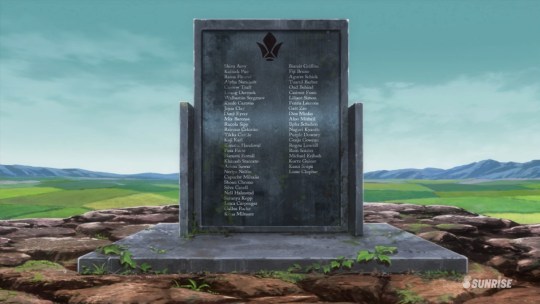
We open with a gravestone/memorial covered in names, almost certainly a number of which belonged to some of the unnamed Human Debris of the first season. Alas, we have no way to track them specifically, but here’s the stone in any case, if for no other reason than that some of the names on here are A+ ridiculous Gundam Names. (R.I.P. Purple Downey.)
We find that some time has passed since we last left our group, but they’ve been plenty busy, swearing oaths to Teiwaz proper. None of our boys in attendance at that ceremony; it seems that it was a bit more exclusive, as we see only Eugene, Mika and Merribit as known figures on the Tekkadan side, and only Naze and Amida (and the very first shot of Jasley, notably) on the Teiwaz side.
No, our very first red-stripe watch shot of the season, even before Akihiro, surprisingly goes to Aston!

He’s on scene when Atra is narrating about how Tekkadan’s new position as military advisor for Arbrau, and the associated Earth-branch location where we will be spending so much time in the season’s second set of episodes. It’s immediately followed by our first shot of one of last season’s boys, Chad, watching Takaki do a certain amount of the talking, though we’ll eventually find out that Chad is, in fact, in charge around here.
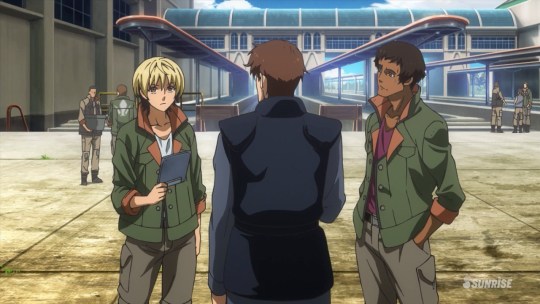
As you can see by the fact that as he’s gotten a uniform jacket that doesn’t have a huge red stripe slathered across the shoulder and back, Chad and our other ex-Human Debris have finally and truly become ex-Human Debris. Praises be! And I’m glad that it is Chad who’s actually in charge; I’ll confess to a moment of miffed protectiveness, back when I first watched the episode, at the idea of Takaki (in season one, still designated as ‘the leader of the younger boys’) having been promoted over Chad. It seemed a trifle unfair, though of course we had no idea which of either of them was better suited to a command position at the time. But more on that in due time.

Our other two members of the original trio follow along shortly, as we find Akihiro and Dante back on Mars. This is our first hint that Dante will also be moving into a more major role; you’ll recall that in the first season, he was an extremely sporadic presence, a third-stringer who showed up periodically to support Akihiro or back up Shino, but who seldom got much at all to do, and tended to vanish from group scenes practically as soon as he’d entered them. You had (or at least, I had) the impression of him as someone who was kind of a jack-of-all-trades, flitting around from one area to another as his presence was required, but with no dedicated position like Chad or Akihiro held. Well, we’ll soon find out that he does indeed have a preference on the matter, and his appearance here, with Akihiro and Shino—Tekkadan’s second- and third-best mobile suit pilots—makes it fairly plain what that preference is going to prove to be.
Our last character to be on the watch for, Derma, will have to wait just a little longer for his first showing of the season.
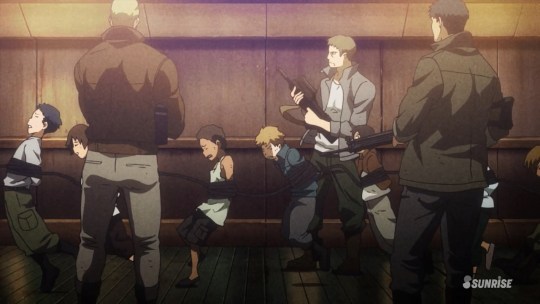
This shot comes up as Atra tells us about the increasing strife in the world and how Tekkadan’s startlingly good performance at Edmonton has lead to a higher number of children being sent to war, and a likewise growing number of Human Debris. So these boys don’t have the red stripe yet, but they’re bound for it. And they are all boys, I notice. We never do see a girl with the signature Human Debris mark, and I wonder a bit about why that is. There are certainly possibilities that leap to mind, but they’re as unpleasant as they are obvious, so I won’t get into them here. I will say that it’s something to keep in mind for when we get to the Turbines backstory.
And speaking of the Turbines! To the tune of a rather jazzy piece of music that I’m pretty sure is played absolutely nowhere else in the series, we find Lafter hard at work beating some training into an extremely outclassed Dante, who’s making some really great faces about it.
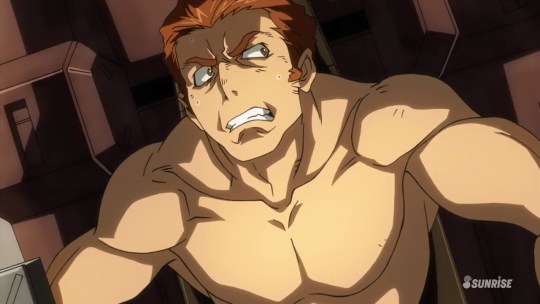
Dante, for all his hacking skills, is kind of a meathead, but he’s an extremely loveable meathead. He’s dedicated and stubborn, earthier and more pragmatic than the perpetually upbeat Shino, but still more openly firey than either Mikazuki, who’s as remote as his namesake most of the time, or the taciturn, stoic Akihiro. This makes him a great addition to the main roster of pilots, giving the writers someone they can be a little comic with—witness his defensive yelling and cursing here about trying his best as Azee shouts at him to react faster—without sacrificing sincerity.
Looking a little exasperated, Yukinojo helpfully namedrops him for the audience, plenty of whom had absolutely no idea who he was, as was very obvious if you were following the various review blogs covering the series at the time. Zack, the pompadour-newbie, observes that this is Dante’s first time in the mobile suit. If I had to guess, I’d say Dante has been pushing for priority in mobile suit training for some time, and pestered everyone about it so much that, when they got in the shipment of Shidens, they decided to let him be first in line for the “Lets all get annihilated by Lafter” party. If he was half as persistent about it as Akihiro was in season one, but way louder, it’s easy to imagine why Yukinojo felt so facepalmy about it.
Rather pleasantly, the new guys assume that Dante’s holding his own as well as he is because of his Alaya-Vijnana implant, a view Shino quickly corrects for them. No, Dante actually is just that capable, or that well-read, or has done that much time in a simulator, or some combination of the above.
Anyway, you guys, I love Dante and so should you.

Directly, we find out that Akihiro is now in charge of a unit of his own, with Ride as his second-in-command, and the little firebrand is very quick to jump in with the drill sergeant talk. Gotta be faster if you wanna get a word in edgewise, Akihiro-han.
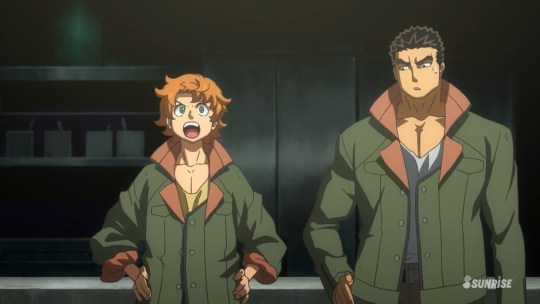
This, incidentally, could suggest that Dante is Shino’s second, if you assume that picture earlier of the four of them talking by the mobile worker is a unit leader meeting of some kind.
When next we see him, Akihiro is clarifying for us how much of its work Tekkadan still does with no shirts on. Dante was shirtless earlier, of course, but that was just for practice, and during the day! Surely, as a fancy official company, Tekkadan doesn’t let its employees do actual commissioned jobs half-naked?

No, in fact, Tekkadan does exactly that, a fact which will be thrown into even more hilarious contrast when they’re teamed up with McGillis for the whole Hashmal misadventure later. Look forward to it.

It’s easy to miss in the glare, but here’s our first shot of Derma for the season! As well as a quick little moment for the ShinoYama shippers, we also find Dante examining a data slate alongside Echo, as probably the most computer-literate people on the field right now. The grouping tells us that Dante is indeed in Shino’s unit, as is Derma, a supposition that will be confirmed shortly. It also lays some early groundwork on Derma and Dante having taken to each other enough to hang out when they’re not immediately on the job, as we will later see.

I really feel for Akihiro in this sequence. He spent almost the entirety of the first season in a mobile suit, and half of it in a Gundam, and now he’s back in this rattling three-wheeled deathtrap as a bunch of mobile suits charge the field? My God, couldn’t they at least have gotten him one of the Shidens or something to pilot? Or is this one of those things where Tekkadan is doing all it can not to escalate, only to look on in horror as a villain proves willing to up the ante (see: Graze Ein entering Edmonton; everything about the Dainsleifs)?
Apparently not, as Shino swoops in to save the day in the newest iteration of his Ryuusei-Go, the lot of which I will at some point assemble a post for you all on, because they’re all great, especially the crash helmet.

And here we have confirmation of Derma and Dante’s placement under Shino’s wing, as well as the headaches it causes poor Derma, who probably never imagined something like this was going to be his life back when we met him in the first season.
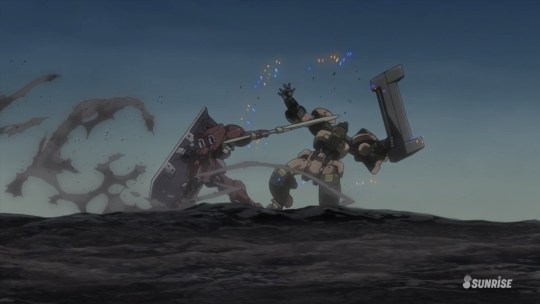
Possibly to not have to think about how deeply embarrassing Shino’s weird naming themes are, Derma moves in, and proves himself to be an entirely capable combatant with a sword, it turns out. Witness his opponent’s jazz-hands of defeat!

Dante, meanwhile, keeps his firing range distance. Judging by his expression, he’s having a bit of trouble here (it is, after all, his very first live combat in a mobile suit). It may also be the case that’s he’s already worked out what Elgar and Enbi are hollering at Hush and Zack about—that this assault is too straightforward, and that there’s going to be more to it than there first appears.
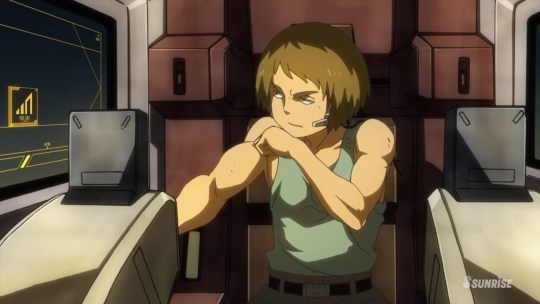
Derma continues to perform like a tiny champion badass, saving Dante (not so good with a sword, it seems) by making a huge skyward leap and landing on Dante’s opponent with his machine’s foot driven squarely into the man’s cockpit. Truly, the difference in their levels of experience is made very clear in this scene, in case anyone has forgotten that Derma fought an unknown number of space battles in a grunt mobile suit under the command of Kudal Kudan, a man who treated his subordinates with all the affection and respect an underground dog fighting ring affords its combatants.
Dante keeps at it like a champ, though, responding that he’ll make it last when Derma asks after the levels of fuel left in his thrusters. It’s a risk he’s taking here, as running out of fuel would leave him completely disabled on the field.

Thankfully, as the early haze of predawn gives way to the blue of early morning, the team ace arrives, with the new opening theme streaming out behind him, and we bring the episode to a close. Before we get to the next one, though, lets hit that new intro, shall we?
OP 3 — Rage of Dust
This opening’s a little fun in that it’s more grounded and contiguous than the others, with less generic Purposeful Walking, Forceful Yelling, or Significant Imagery. There’s a sense that we’re seeing snippets from a particular set of events—a Tekkadan sortie in space against Arianrhod, a fight the Earth branch and McGillis are dealing with on Earth, and so on. For example…
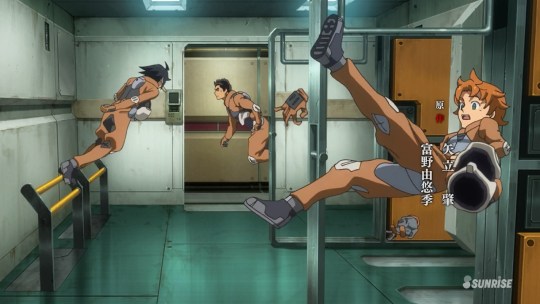
Our first shot, right near the beginning, is of Akihiro passing by a room where Mikazuki and Ride are suiting up for space combat. Akihiro’s managed to get dressed more quickly than either of them, because Ride is still kinda bad at it and Mikazuki is trying to do it one-handed while also bolting a snack.
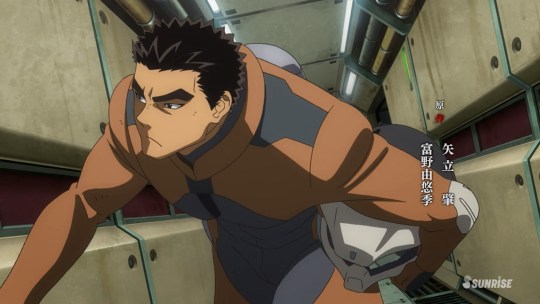
He heads on down the hall, serious as ever.

We find Derma and Dante, paired up again, drifting above a Shiden hanger, also suited up, with Dante getting some orders of some kind via his helmet.

After the title screen, we skip to some shots of more everyday life, like Akihiro and company being amused at Orga’s irritation at the petty everyday difficulties of running a business.
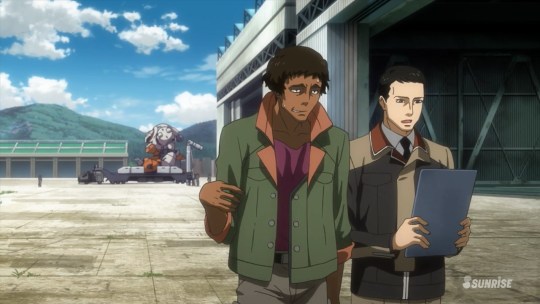
Chad is dealing with similar fine detail work, though assisted by, as we will find, a far more treacherous accountant.

Aston we find having a late afternoon snack with his new (only) favorite family.

He’s very happy, and it’s a little impressive how hard you can raise a death flag using no more than a smile in an opening sequence.
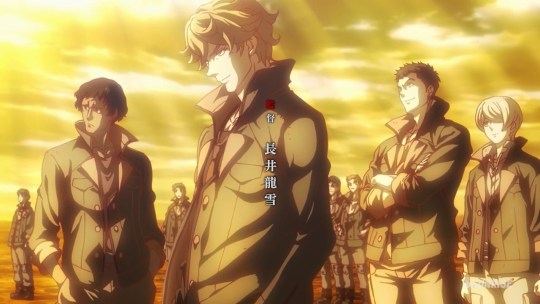
We are now into the more standard imagery, but at least everyone looks nice. Here’s Chad with Eugene, our two responsible, sub-leader types (and Shino, who dived out of the sub-leader position like he was getting scored on it).

Akihiro gets the screen with the two he’s shared his last name with, though of course we won’t find that out for some time.

And there’s Dante, squirreled well away from anyone significant to him. (Do your best, Dante.)
And that’s it for the new intro, so lets get onto the next episode!
EPISODE TWENTY-SEVEN — In the Midst of Jealousy

Showing his similarity to his squad leader, Dante is entirely ready to pursue the Dawn Horizon guys when Mikazuki drives them into retreat.
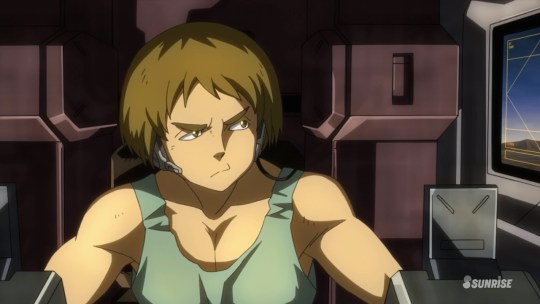
Derma is little different, protesting when Mika calls them back from following. He also shows the distinctive shape of his mouth here. I think there’s a Japanese term for this quirk of character design, which I do not immediately recall, but it’s pretty unique to Derma (albeit not wholly consistent), and gives him a kind of sulky look, like someone whose lips are perpetually set in a terse line. Also, the kid is ripped. Not so different from any of the others, but seriously, go back and compare his build in the Brewers arc to here. Tekkadan has been good to him.
Derma and Dante both begin rebuking Mikazuki for his reckless usage of Barbatos, which is fun. Derma, having a particularly terrible space rat kind of upbringing, doubtlessly has a pretty finely tuned handle on fuel management, which Mikazuki does not and never will bother with developing, while Dante is just miffed that they just got it fixed, too. One gets the sense that everyone who’s been with Tekkadan for any length of time gets pretty used to Mikazuki Being Like This.
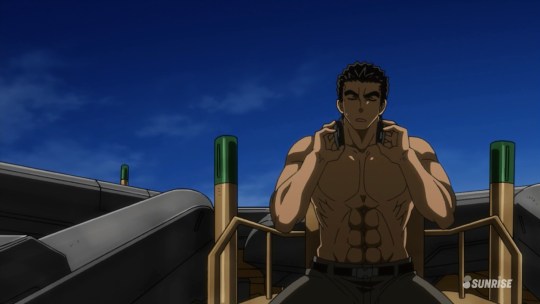
Certainly it’s not news to Akihiro.

We see again here, on the Dawn Horizon flagship, the piratical red stripe theme. The captain, Sandoval Reuters, has a big red bullseye painted on his forehead as well. At this point, I almost begin to wonder if the red stripe is more a mark of Outer Sphere horrors than anything else. Piracy, slavery; throw a red stripe on it and it’s like a code for civilized society to stay as far away from it as possible.
In any case, while Dawn Horizon absolutely uses Human Debris, as we will later find, they certainly don’t use them on the bridge like the Brewers did, which definitely suggests an organization that has its act together a bit more thoroughly than Brooke Kabayan did.
We return to a sobered Tekkadan, where the veterans are discussing a future containing up to ten assault ships, and the new recruits are wrestling with the reality of how quickly and brutally death can show up when you’re working for a mercenary outfit. Akihiro comes in and tells the newbies that anyone who wants to quit can do so. Tekkadan lets people decide if they want to stay or leave, live or die.
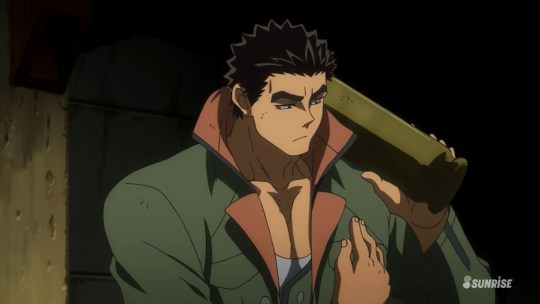
He strokes his fingers down the front of his uniform while he says this, right over where his stripe used to be, and it’s maybe my single favorite of his character moments in the entire show. It’s quite clear that he’s thinking back to when Orga took over and offered the lot of them not only their freedom, but a choice, to go and take severance pay with them, or to stay and be as much under the organization’s protection as any other member. I love that the show just trusts us to have figured out what the stripe indicated, remember where it was, and know why that freedom of choice was and is so huge to Akihiro that he needs to make sure everyone understands that they have it.
It’s unclear how much of this weighted history the newbies are aware of, but Shino certainly understands the significance, giving Akihiro a rueful, understanding smile.
Meanwhile, in far less introspective territory…
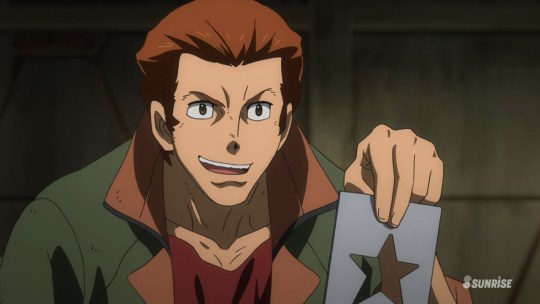
Dante is super pumped about being a mobile suit pilot now, and wants to start putting a kill count on his unit. I, meanwhile, reflect on the fact that Dante, who until he got his first paycheck doubtless never actually owned anything post- whatever incident it was that landed him with a Human Debris stripe, wants to start personalizing his unit right away, anything to put his mark on it. Taken together with his season one preview dialogue about finding comfort in neatly aligned computer data, it suggests someone who values physical proofs of existence, and is reassured by things you can observe and interact with, regardless of what anyone else thinks of them or you.
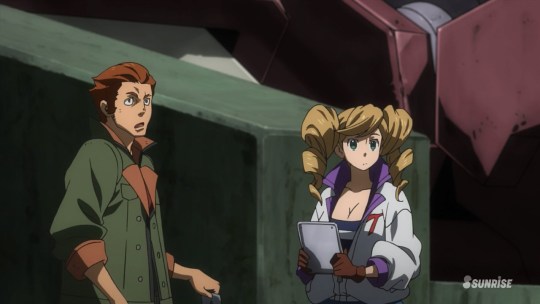
The Turbines girls (and Ride) are less than impressed, reminding him that he didn’t take down anybody solo, and also, it isn’t his personal unit to mark up yet anyway. Poor Dante gets no respect. I’m glad he’s of a personality that can roll with being rebuked by someone several years younger than him with nothing more than some complaining about procedure.
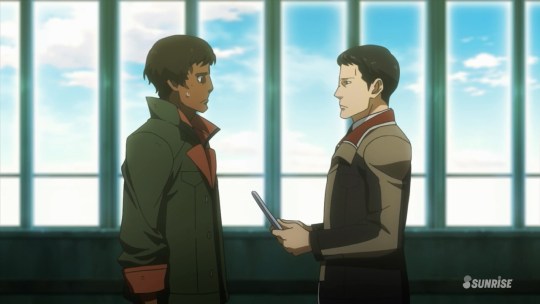
Meanwhile, back on Earth, Chad has his hands full with his own Teiwaz liason, Radice here, who is already talking faintly treasonous talk about how HQ (Tekkadan) is failing to uphold their bargains, and doing that talking right out in the open hallway instead of taking it to whatever sort of private office Chad must logically have.
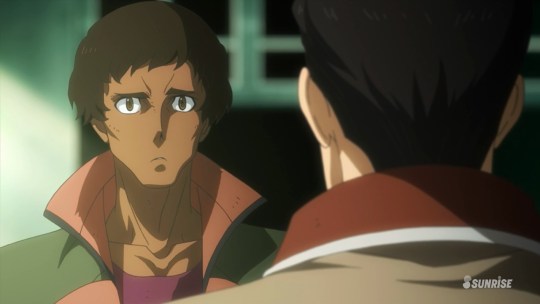
When he gets to the point of suggesting that the troubles of the Mars branch have nothing to do with the Earth branch, Chad looks surprised, then stern, and responds with a firm defense of Orga’s requests and considerations of their situation. When Radice doesn’t back down, only complaining more openly, Chad tells him point blank that regardless of the branch Orga is the boss of Tekkadan, which means his words are to be trusted and followed; that this is what defines Tekkadan.
Guys, I’ve liked Chad since season one, but I didn’t blame anyone back then for not knowing who he was. His position was never detailed, he had nothing but throwaway dialogue, and you never saw him away from work long enough to get any kind of bead on who this guy was and made him tick. This is his first real stand-out scene as a character, and it is so, so defining. It gives us so much material to work with in one scene.

It tells us that this is a young man who’s responsible, open-minded enough to let others say their piece, reluctant to push too hard or make a scene, but wholly willing to plant his feet and refuse to budge when someone goes too far in questioning the people and organization to which he is unfailingly, unstintingly loyal. Knowing he’s in charge despite not being very prominent last season tells us also that he works well with others, that he’s cool-headed enough to be put in charge, and more than that, put in charge of a branch located on a planet he’s barely seen, working with people he doesn’t know, dealing with anything from unintended microaggressions all the way up to full-throated, to-his-face ethnocentricism. Taking that position (because I very much doubt he had the self-worth to volunteer for it) shows him as either quite brave or distressingly selfless, depending on how long he thought about it before accepting it.
You guys. I love Chad. You should too.
ANYWAY, Radice gets frustrated and stalks off. He says it’s because the conversation isn’t going anywhere, but with what we know about how the upcoming arc plays out, I suspect it’s more because Chad refuses to back down, and he really hates it when teenagers don’t concede to his adulthood. There’s maybe no character in the series who more purely disdains Tekkadan as children, I think, than Radice, so someone like Chad, who’s serious and responsible and, just sometimes, completely impossible to sway, must be just infuriating.
It would be very satisfying to me if it didn’t lead to Chad spending the bulk of said upcoming arc in uncertain health and almost wholly offscreen. SIGH.
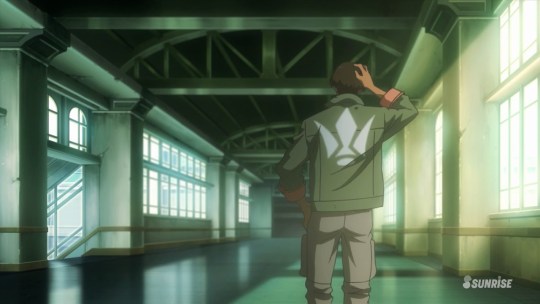
Chad also seems to find the encounter frustrating, sighing hard and rubbing his head, probably discontent and wondering if there’s any better way to handle that guy than he can figure out, along with being worried about his friends back home.
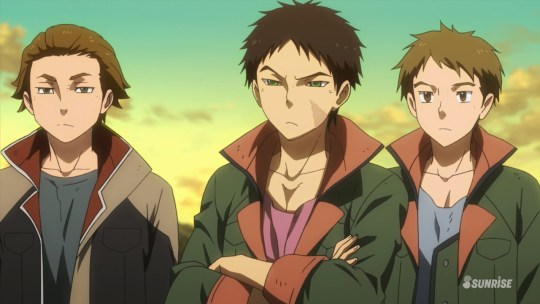
Meanwhile, other adults are getting mouthed off at by even younger children, who have a far less respectful attitude about it. Aston, we find, has been trying to “show the ropes” to some of Arbrau’s military, and one of them has not taken kindly to some point of policy or another, and is having to be physically restrained from taking a swing at the very unapologetic Aston.
Takaki breaks it up and apologizes, but cannot get Aston to do the same.

Man, this kid’s eyes. They were sharp and vivid even in season one, but they’ve only become moreso with the increased focus from the narrative. It’s interesting that he played kind of a mediator with his companions with the Brewers, trying to ease both sides of the closest thing we ever saw to an inter-group conflict with them. He’ll be doing the same later on in this arc with his new group, but he certainly doesn’t seem to give a damn about playing the peacekeeper where outsiders are concerned. Aston, your wolfpack tendencies are showing.

Back at the Uno household, we find Takaki has invited Aston back for dinner, though Aston was expecting a scolding from Chad’s second in command. It’s a little notable here, I think, that compared to Derma, Aston and Takaki have not bulked up anywhere near as much, suggesting either that Derma is really dedicated to a workout routine or that there is less conflict/stiff competition for mobile suits on Earth. It could be an inconsistency between animators, but I’ll be keeping an eye on it.
When asked how his food tastes by Takaki’s sister Fuuka, Aston says it tastes good, then shares a somewhat inconsiderate (and depressing) personal detail: that he used to eat garbage growing up, so everything tastes good now. (This suggests he ate even worse before joining the Brewers, who at least seem to have thrown nutrient bars at him every now and again.)

He asks Takaki if he doesn’t get lonely on Earth, away from Mars, and then gets just the tiniest bit flustered when Takaki calls him a friend, and man, I just don’t buy this kid as a detached recluse who never cared about anyone before Takaki and Fuuka. How would he even understand loneliness well enough to ask after it if that were the case? I wonder if we’re meant to read all the ship-teasing that will follow as legit? Because it would certainly explain things if Aston felt something different for Takaki than for Masahiro and Derma and the rest but could never quite put his finger on the word for that difference, so just assumed that his more intense feelings After Takaki must have indicated a dearth of feelings Before Takaki, when it’s plain that he’s always been fairly invested in his immediate peer group.
Anyway, I will continue to try to puzzle Aston out as we move on, and beg your forgiveness for harping on the same point repeatedly.
Normally at this point I would cover the third ED, Shounen no Hate, but as it turns out, it has not a lick of red stripes in it anywhere, so it’s a wash for our purposes.
That said, I have the next episode down, and have been making relatively steady progress through them, so our next episode should not be altogether too long in coming. Look forward to it!
#mobile suit gundam: iron-blooded orphans#g tekketsu#gundam ibo#human debris#akihiro altland#chad chadan#dante mogro#aston altland#derma altland#human debris project#my writing#ibo meta
13 notes
·
View notes